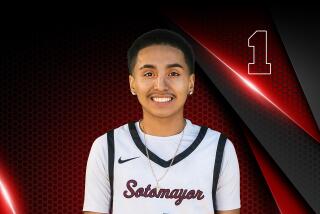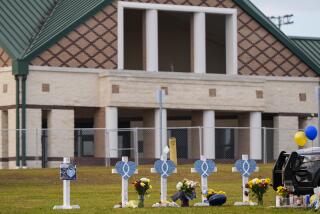Youth Who Shot Himself in Head in Classroom Near Death : Why? Suicide Try Baffles Family
- Share via
Oscar Marquez has always been the quietest among his brothers. He had no friends outside the tightly knit Salvadoran family and spent his weekends listening to records and watching television at home.
Occasionally Oscar, 18, would join his brothers in activities at a nearby church where the young men participate in a youth group and the church choir, teach the catechism and are known as a model family in the community.
“There was never a hint of any problem,” said Daisy Portillo, 22, a cousin who shares the modest mid-Wilshire District home with four Marquez brothers and their father. “He has always been so calm and playful, always joking around with us at home.”
But the Marquez family had some dark memories of their native El Salvador. Four years ago, Oscar accompanied his mother on a gruesome search of hospitals and morgues in a vain attempt to find the remains of her father and a sister killed in cross-fire between rebel and government forces near their hometown of Corinto. Oscar, however, never talked of this, nor of the violent deaths of several other family members in El Salvador, Portillo said.
Upon his arrival in the United States two years ago, Oscar followed his elder brothers’ example, dutifully going to school during the day and working nights at a record manufacturing company with two of his brothers to contribute his share to the household.
On Wednesday, shortly before noon in the middle of a class at Los Angeles High School, Oscar drew a gun, put it to his temple and fired. On Thursday the family maintained a tearful vigil at Cedars-Sinai Medical Center, where Oscar remained in critical condition, sustained by a life-support system.
“There is no hope,” said his brother, Elio, 30.
The attempted suicide, which stunned students and school officials, remains a mystery, said Wilshire Division Detective Frank Bolan.
“He was never despondent nor had any problems with anyone,” Bolan said. Nor could Bolan find any evidence to support published reports that Oscar was depressed over a rejection from a girl at school.
“The worst thing is not knowing why,” said Oscar’s father, Felix Marquez.
Elio was the first of his 12 brothers and sisters to arrive in the United States almost 10 years ago. A few years later, when civil war broke out in El Salvador, Elio received the news that one of his brothers had been killed. About a year later, another brother was gunned down by machine-gun fire not far from their hometown, near the Honduras border.
Elio began working “night and day” to save money and help bring his brothers to join him “so they wouldn’t be exposed to the danger,” he said. Young men were most at risk, he said, because they were forced to join one or the other of two warring factions.
Elio helped three brothers and most recently two sisters and his father to join him in Los Angeles.
“I did everything I could to bring them here. . . . We were all very comfortable with life here, very happy to be together,” he said, speaking in Spanish. “And now this.”
The brothers have been reluctant to call their mother in El Salvador with the sad news.
“She’s been through so much already--Oscar, too,” Elio said. “Maybe it was all too much for him.”
The family’s only hope now is that doctors can keep Oscar alive long enough to try to arrange for their mother to come to the United States to see her son one last time. But the family has been told that there is little hope that immigration authorities will permit it, Elio said.
A concern of family friends--and one the family has yet to wrestle with--is how to pay hospital costs, since none of the brothers has medical insurance. Sisters at the family’s parish, St. Thomas the Apostle, have begun a collection.
The brothers have tried to convince their mother to join them, but she has her four youngest children to care for at home and “says she doesn’t want to leave the land where my dead brothers are,” Elio said.
The young men are devoted to their mother “because of all her suffering . . . and because she’s worked so hard all her life for us and taught us to survive and to work together,” Elio said.
Virginia Rodriguez, 16, a school mate of Oscar’s and one of several members of the church youth group who kept the family company through their vigil at the hospital, described Oscar as a loner who had no friends at school.
“He was always alone,” said Rodriguez, who would occasionally join him for lunch. “We’d joke around, sometimes he’d talk about girls. But he didn’t have a girlfriend. None of us knew anything was bothering him.”
At the high school Thursday, school officials were intent on “getting the school back to normal.” A team of school district psychologists continued counseling students and staff.
The shooting may remain a mystery. In police records, Oscar’s story ends as “a witnessed attempted suicide,” Bolan said.
More to Read
Sign up for Essential California
The most important California stories and recommendations in your inbox every morning.
You may occasionally receive promotional content from the Los Angeles Times.










